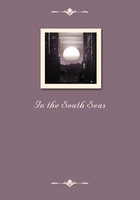
第36章 THE STORY OF A PLANTATION(1)
TAAHAUKU,on the south-westerly coast of the island of Hiva-oa -Tahuku,say the slovenly whites -may be called the port of Atuona.
It is a narrow and small anchorage,set between low cliffy points,and opening above upon a woody valley:a little French fort,now disused and deserted,overhangs the valley and the inlet.Atuona itself,at the head of the next bay,is framed in a theatre of mountains,which dominate the more immediate settling of Taahauku and give the salient character of the scene.They are reckoned at no higher than four thousand feet;but Tahiti with eight thousand,and Hawaii with fifteen,can offer no such picture of abrupt,melancholy alps.In the morning,when the sun falls directly on their front,they stand like a vast wall:green to the summit,if by any chance the summit should be clear -water-courses here and there delineated on their face,as narrow as cracks.Towards afternoon,the light falls more obliquely,and the sculpture of the range comes in relief,huge gorges sinking into shadow,huge,tortuous buttresses standing edged with sun.At all hours of the day they strike the eye with some new beauty,and the mind with the same menacing gloom.
The mountains,dividing and deflecting the endless airy deluge of the Trade,are doubtless answerable for the climate.A strong draught of wind blew day and night over the anchorage.Day and night the same fantastic and attenuated clouds fled across the heavens,the same dusky cap of rain and vapour fell and rose on the mountain.The land-breezes came very strong and chill,and the sea,like the air,was in perpetual bustle.The swell crowded into the narrow anchorage like sheep into a fold;broke all along both sides,high on the one,low on the other;kept a certain blowhole sounding and smoking like a cannon;and spent itself at last upon the beach.
On the side away from Atuona,the sheltering promontory was a nursery of coco-trees.Some were mere infants,none had attained to any size,none had yet begun to shoot skyward with that whip-like shaft of the mature palm.In the young trees the colour alters with the age and growth.Now all is of a grass-like hue,infinitely dainty;next the rib grows golden,the fronds remaining green as ferns;and then,as the trunk continues to mount and to assume its final hue of grey,the fans put on manlier and more decided depths of verdure,stand out dark upon the distance,glisten against the sun,and flash like silver fountains in the assault of the wind.In this young wood of Taahauku,all these hues and combinations were exampled and repeated by the score.The trees grew pleasantly spaced upon a hilly sward,here and there interspersed with a rack for drying copra,or a tumble-down hut for storing it.Every here and there the stroller had a glimpse of the CASCO tossing in the narrow anchorage below;and beyond he had ever before him the dark amphitheatre of the Atuona mountains and the cliffy bluff that closes it to seaward.The trade-wind moving in the fans made a ceaseless noise of summer rain;and from time to time,with the sound of a sudden and distant drum-beat,the surf would burst in a sea-cave.
At the upper end of the inlet,its low,cliffy lining sinks,at both sides,into a beach.A copra warehouse stands in the shadow of the shoreside trees,flitted about for ever by a clan of dwarfish swallows;and a line of rails on a high wooden staging bends back into the mouth of the valley.Walking on this,the new-landed traveller becomes aware of a broad fresh-water lagoon (one arm of which he crosses),and beyond,of a grove of noble palms,sheltering the house of the trader,Mr.Keane.Overhead,the cocos join in a continuous and lofty roof;blackbirds are heard lustily singing;the island cock springs his jubilant rattle and airs his golden plumage;cow-bells sound far and near in the grove;and when you sit in the broad verandah,lulled by this symphony,you may say to yourself,if you are able:'Better fifty years of Europe .'
Farther on,the floor of the valley is flat and green,and dotted here and there with stripling coco-palms.Through the midst,with many changes of music,the river trots and brawls;and along its course,where we should look for willows,puraos grow in clusters,and make shadowy pools after an angler's heart.A vale more rich and peaceful,sweeter air,a sweeter voice of rural sounds,I have found nowhere.One circumstance alone might strike the experienced:here is a convenient beach,deep soil,good water,and yet nowhere any paepaes,nowhere any trace of island habitation.
It is but a few years since this valley was a place choked with jungle,the debatable land and battle-ground of cannibals.Two clans laid claim to it -neither could substantiate the claim,and the roads lay desert,or were only visited by men in arms.It is for this very reason that it wears now so smiling an appearance:cleared,planted,built upon,supplied with railways,boat-houses,and bath-houses.For,being no man's land,it was the more readily ceded to a stranger.The stranger was Captain John Hart:Ima Hati,'Broken-arm,'the natives call him,because when he first visited the islands his arm was in a sling.Captain Hart,a man of English birth,but an American subject,had conceived the idea of cotton culture in the Marquesas during the American War,and was at first rewarded with success.His plantation at Anaho was highly productive;island cotton fetched a high price,and the natives used to debate which was the stronger power,Ima Hati or the French:deciding in favour of the captain,because,though the French had the most ships,he had the more money.
He marked Taahauku for a suitable site,acquired it,and offered the superintendence to Mr.Robert Stewart,a Fifeshire man,already some time in the islands,who had just been ruined by a war on Tauata.Mr.Stewart was somewhat averse to the adventure,having some acquaintance with Atuona and its notorious chieftain,Moipu.